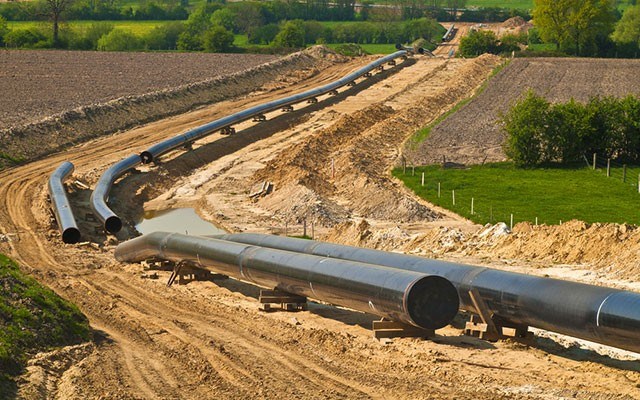On Saturday, Sept. 3, a group of Native Americans was peacefully protesting the $3.8-billion Dakota Access pipeline that would carry a half million barrels of crude per day from North Dakota's Bakken oilfield to Illinois, when the company sent in mercenary security personnel with attack dogs and pepper spray. The project has faced months of resistance from the Standing Rock Sioux and members of 100 other tribes who've arrived in support from across North America. Other than arrests for blocking machinery, this was the first physical violence. Several protestors — including a child and pregnant women — received dog bites, while some security and dogs were deservedly pummelled in return. It's sad, but, increasingly, this will be the face of Big Oil versus The People.
Mainstream corporate media in the U.S. has all but ignored the situation because — more so even than our own shameless Postmedia — it is deeply in bed with oil interests. But with Canada's energy and climate policies in clear shambles after protests and arrests at an NEB Energy East pipeline hearing in Montreal, how long until Canada has its own dog-and-pepper-spray show to report?
Canada is at a climate-change crossroads, but the feds' commitment in Paris to limit warming to less than 2C suddenly seems like coal dust in the wind. If it can't get all provinces and territories — some of which carved out their own carbon policies in the vacuum created by the criminally negligent HarperCons — to agree on a framework, it'll have to impose one. Otherwise?
"The alternative is more stasis, a patchwork quilt of incoherent policies, a lack of focus on critical economic transformation and finally an ongoing failure to meet our international commitments and do our fair share to avoid dangerous levels of global warming," wrote Tim Gray of Environmental Defence in the Toronto Star.
Unfortunately, that seems the direction we're headed. Post-Montreal, conservatwat pundits — well, their National Post proxies — whined about the can of worms that obtaining "social licence" for energy projects represents, panning the notion as untenable and averring that any increased opportunity for public input simply leads to more protest. True, but what's missed is these protests' connection to a leviathan of societal frustration that has been growing for years.
For most, it's not about granting social licence so much as acknowledging that licence granted on the basis of any truly objective review never happens, as seen in the number of projects the NEB turns down (almost none). The Northern Gateway process was a sham, and current review panel and NEB hearings over Kinder Morgan's TransMountain and Energy East pipelines, respectively, are equally biased, obvious to anyone with a shred of acumen (or access to panelists' résumés). When all peer-reviewed empirical and theoretical science suggests that a project assessment is fundamentally flawed and it should not proceed, but the proponent's self-funded analysis somehow says otherwise, you have a visible credibility problem. Additionally, panels that so obviously lack objectivity, stacked with industry toadies wading waist-deep in conflicts-of-interest, suggest a failsafe for governments and industry who are simply lying about projects that have no demonstrable public need (Site C dam), vanishingly small benefit to anyone but the investors (Northern Gateway), and enormous, unjustifiable local, regional and global environmental impacts (everything LNG). No wonder naysayers come out in droves, taking whatever opportunity is at their disposal to voice concerns that shouldn't require voicing. The radical-extractionist types (or anti-environmentalists, take your pick) who back these projects don't attend hearings because they don't need to — the fix is in and they can wait until the meagre resources of those who take issue are exhausted, and the project receives its inevitable stamp of approval. That makes hearings a costly waste of time for both sides.
With the connection between Petronas' LNG terminal, B.C.'s rapacious fracking industry, and B.C. Hydro's grossly misguided Site C becoming clear, we can see why the feds quietly granted construction permits prior to the August long weekend, neither announcing nor explaining their rationale. It's been a pattern in the current government's gross failure to honour energy-related promises that range from ending fossil-fuel subsidies to tackling climate change by redirecting Canada into a new economic paradigm. When asked directly about the Energy East controversy during the G20 in China, Prime Minister Justin Trudeau wouldn't refer to the specific case, sidestepping with general comments about the hearings process. Whether for Canadians or the Chinese, it was a pathetic display of cowardice — the kind we've come to expect from... conservatives and their attack dogs.




